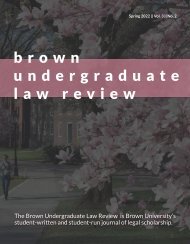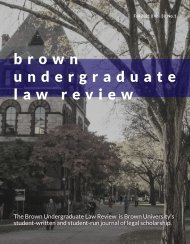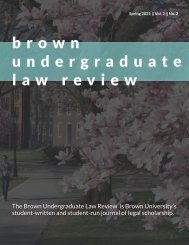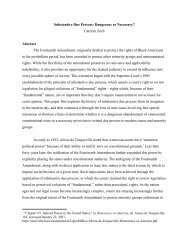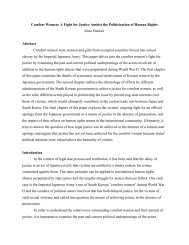Brown Undergraduate Law Review -- Vol. 2, No. 1 (Fall 2020)
We are proud to present the Brown Undergraduate Law Review's Fall 2020 issue. We hope you will all find our authors' works fascinating and thought-provoking.
We are proud to present the Brown Undergraduate Law Review's Fall 2020 issue. We hope you will all find our authors' works fascinating and thought-provoking.
Create successful ePaper yourself
Turn your PDF publications into a flip-book with our unique Google optimized e-Paper software.
Was Privacy a Mistake? An Examination of Privacy, Liberty, and Equality in Reproductive Freedom
female reproductive rights. As Ely argues, liberty can only liberty on the practice of equality, but also fully embracing
be pursued when all citizens in a democracy are considered and legalizing this connection? something Justice
on an equal basis. Ginsburg applies this argument to
reproductive rights as she suggests that women can only
exist as equal citizens when they live in a world where
restrictions are not placed on their ability to receive an
abortion. While Ginsburg ultimately uses notions of
privacy previously established in Roe and Casey as the
Ginsburg could? and arguably should? have advocated
for in her dissent in Carhart. Here, the Court?s ruling
serves as a model that Ely and Ginsburg have strived to
implement: utilizing an equal protection framework to
ensure basic human rights.
Privacy: A Mistake
basis of her argument against the Court?s ruling, it is clear
from her previous work on Struck and in the language of
her dissent that her ultimate belief is that women cannot
achieve true constitutional liberty unless they have
complete equality under the law, which requires the
recognition and granting of reproductive rights under an
equal protection framework. 23
Thus, the utilization of the right to privacy as a vehicle
through which abortion rights are granted is a mistake. It is
a mistake because this process does not acknowledge
reproductive freedom as what it should be: a conversation
surrounding gender inequality and equal protection.
Privacy does not protect or reinforce the equal status of
women; it does not recognize the innate burden women
While not related to women?s reproductive rights, the
constitutional duality between liberty and equality was
affirmed as a vehicle that granted marriage rights under an
equal protection framework in Obergefell v. Hodges
(2015). In this case, the Court held that the Due Process
Clause of the Fourteenth Amendment does not only
guarantee the right to marry as a protected liberty but also
that the Equal Protection Clause mandates that the
preceding analysis be applied to same-sex couples in the
same manner as it does to opposite-sex couples. 24 In the
bear because of their reproductive capabilities, and because
of the institutionalized structure of society that already
places a significant portion of child rearing on mothers.
Privacy instead provides a false notion of liberty, leaving
room for states to infringe upon the freedom of women to
make decisions for themselves. If the right to privacy in
cases of abortion is derived from liberty emphasized in
Roe and Casey, and liberty is intertwined with equal
protection, privacy is a false derivation of liberty if it is
unable to grant equality.
court?s opinion, Justice Anthony Kennedy writes,
In her essay ?On The Distinction Between Sex and
The right of same-sex couples to marry that is part of
the liberty promised by the Fourteenth Amendment is
derived, too, from the Amendment?s guarantee of the
equal protection laws. The Due Process Clause and the
Equal Protection Clause are connected in a profound
way, though they set forth independent principles. 25
This case serves as an example of the Court not only
Gender,? Susan Okin illustrates the limitations of privacy
in establishing equality; she writes of ?false gender
neutrality,? the concept that simply an acknowledgement
of women by shifting language from ?he? to ?he or she,?
or ?persons,? in political theories does not sufficiently
recognize their strife, but instead leads to a notion of false
inclusion. She writes,
acknowledging the reliance between the achievement of
23. Brettschneider. Decisions and Dissents, xxx.
24. Obergefell v. Hodges, 576 U.S. 644 (2017).
25. Ibid., 576 U.S. 663.
Brown Undergraduate Law Review
48




